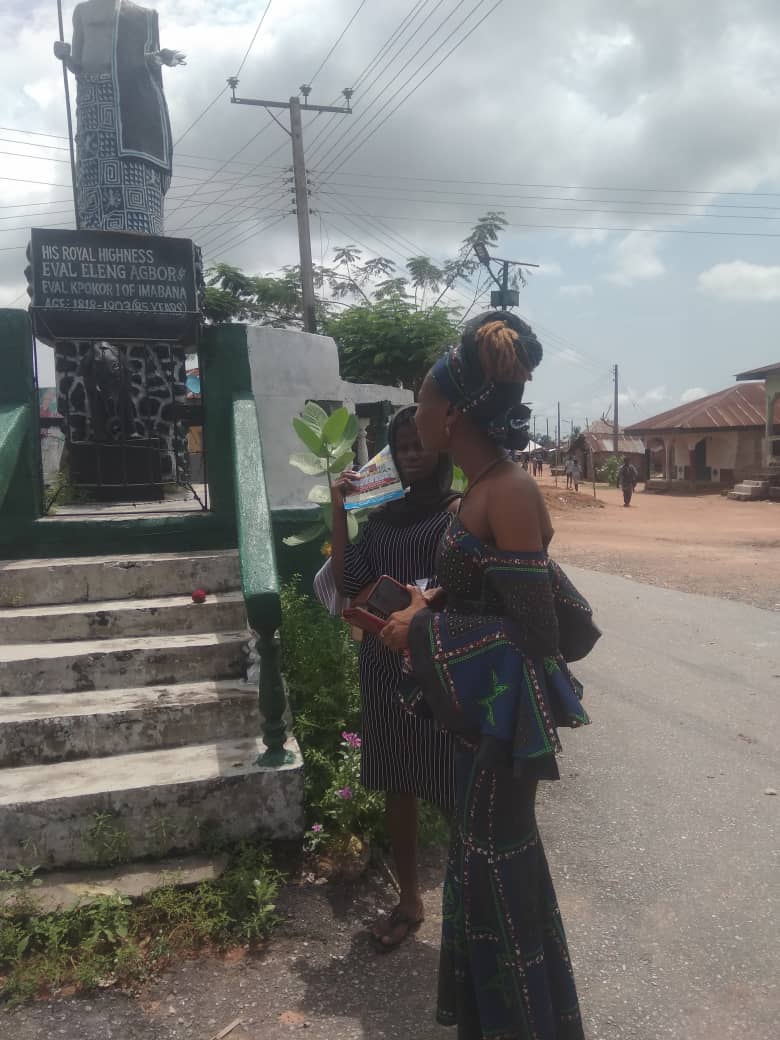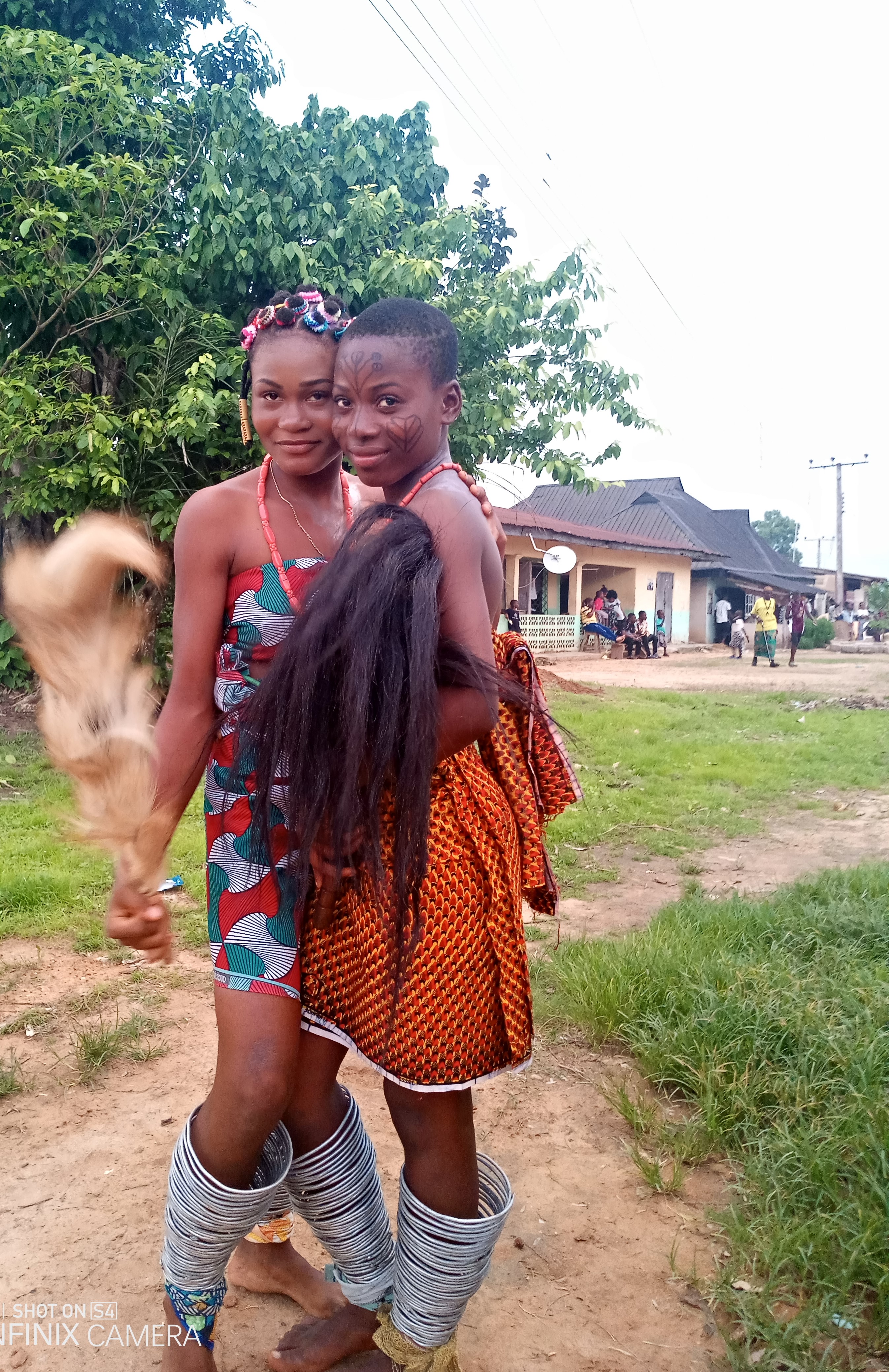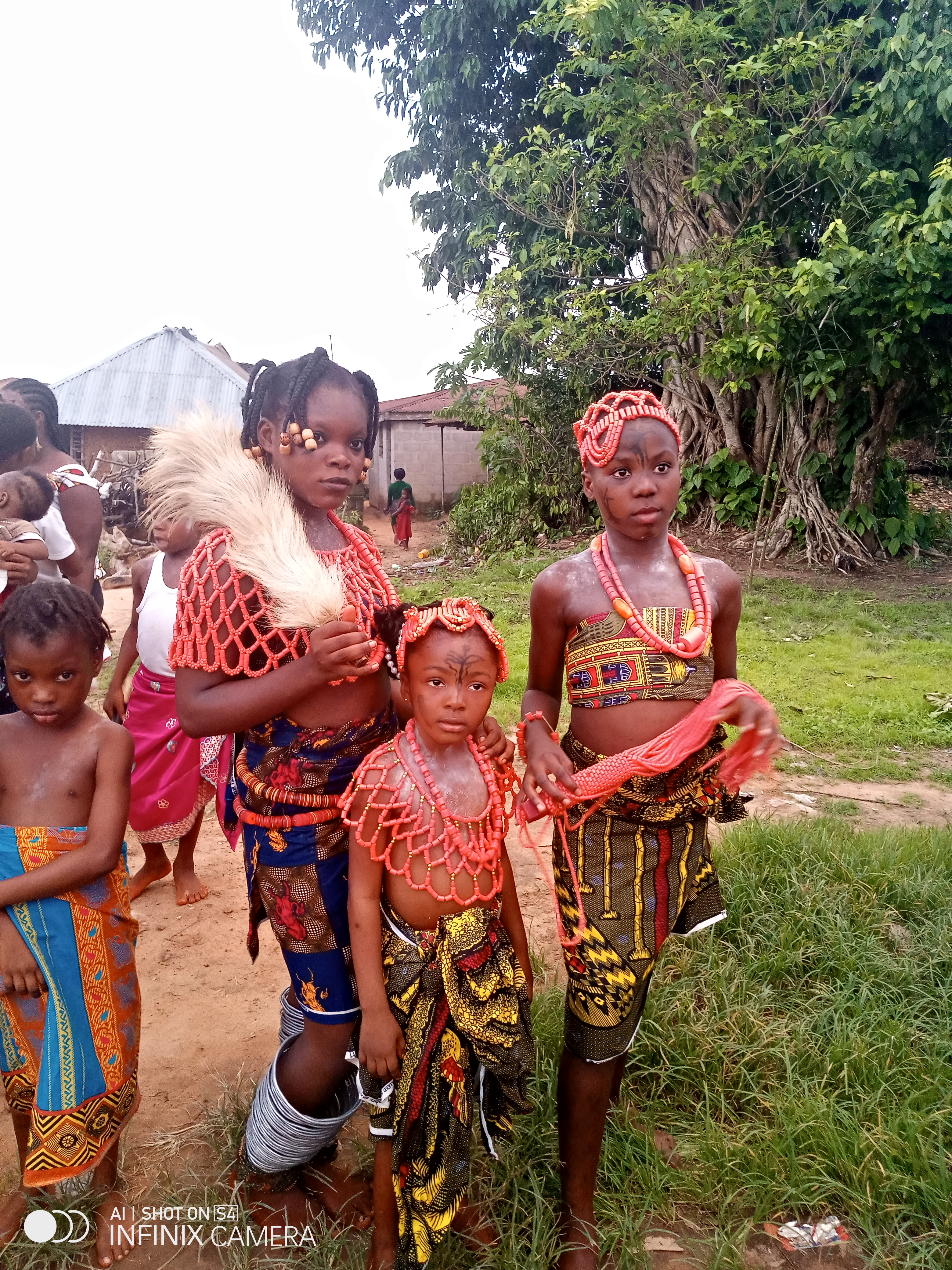The Aji Festival of Igbo Imabana
by
Deborah Zarmai
The Aji festival of Igbo imabana
The individual starts socialisation in a society made up of other people. Each society develops a culture that moulds the behaviour of its members. Thus, the local culture becomes a basis for further socialisation. Aji offers an opportunity for the indigenes and other people from far and near to participate in the festival such as Ediba, Adadama, Ekureku, Ugep, Igbo Imabana. This helps to bring unity, integration and understanding among the natives and their visitors. Ilike usually participated freely in Aji gatherings.
In all facets of social life, the Aji festival reigns supreme in Ilike. Aji festival offers an opportunity for the indigenes of the area to reunite at least once a year, as a people to appreciate their culture, mark their identity and ensure the continuity of their tradition. Such all-embracing assemblies of chiefs and citizens ensure continuous social integration.
Igbo Imabana is in Abi Local Government Area comprises of four main wards namely: Levachiel, Lekpachiel, Ikamine and Agba. During the period of migration, the people of Igbo Imabana took up a settlement at Ezillo, Ijekwe and Idodo. Another myth states that the people of Agba ward of Ilike were the last group to cross to the western bank and that the Agba ward brought Edele to Ilike because Edele is normally called Edele Agba. This theory concerning Agba seems to bear some truth because there is a parent deity- the Ato Agba deity- owned by one of the wards in Ilike. This serves both the interest of its ward and that of the entire town. The shrine of the Ato Agba deity is located in the Agba ward in Ilike.
The shrine of the deity is the repository of all sacred materials for Edele. Thus it is clear that Edele came to Ilike in the course of the migration of the Ilike people of the Agba ward in particular. The four towns constituting the Agba clan have annual feasts. They are Aji of Ekureku, Aji of Imabana, Aji of Adamawa (all celebrated around) and the Edele of Itigidi. Edele came to be played during Aji in Ilike and as the Agba ward brought this annual festival, the whole town adopted it. In Ilike, Edele is a yam festival celebrated just before new yams are harvested. The celebration is concluded with various sacrifices to deities- Ibritam- the aim being to appease the gods so that the harvest would be plentiful and future yam cultivation would produce rewarding yields.
 This is me in the village square (Deborah Zarmai)
This is me in the village square (Deborah Zarmai)
The harvest season normally falls between June and August every year. This is why the three Agbo towns- Adadama, Ekurek and Imabana- hold their Aji feast around June and July every year. Thus, as soon as a decision is made on the date that yam harvesting would commence, a day would be fixed. This is usually on a special market day called Eke and ends on the third market day- Evoge. Thus among the Agbo towns, Ilike celebrates Aji last.
Aji, which is ever so fascinating, is played in instrumental rhythms, without the singing of any kind. The instruments used include three drums- Lebis, Lekuma and Ipele which is the one that introduces the chief to the dance. There is “Iwulasasa” made of basket shingles and “Etutu” a sort of horn used as a trumpet. Before the Edele festival is celebrated, the Meyeye feast- a feast which ushers in the festival- is held on Nkwo, a market day in Ilike. The feast is observed by elderly members of the community at a secret spot. It involves sacrifices to the gods, preparation of soup and pounded yam, which, the elders consume there. After two Nkwo market days following the Meyeye feast, people hail the approaching Edele by shouting “Ahe he! Ahe he!”. This is done only after the completion of the Meyeye feast. The male folks then beat the wooden drum- "Ikolo" to announce the festival to the public. It is worthy to note that it is only after the Meyeye feast that Edele is made public.
Once an Eke market day is fixed by the Head Chief (Eval) and his aides (Akpans) for the commencement of Edele, an announcement is made by the town crier. The town crier is always delegated by the Head Chief to announce the day Edele starts. A few days to the Edele, four to five age grades are summoned by the chief and directed to clear the playground - Lekuma. This playground is virtually located in Agba ward. It is believed that many deities inhabit the playground. As indicated earlier, Edele has to be played for three days, beginning on an Eke market day. The first day is known as Edele Abege. The play starts at about 3:30pm and it is primarily meant for children.

On the second day, Edele is played specifically for adults and members of the public, visitors and people from neighbouring villages could participate in this. This is a more popular day and is referred to as Edele “Atulukpa”.
On the third day, the war chief, dances (Itomono/AtoAgba). He comes from Agba ward and he is tall and huge. The festival is rounded off by moving around all the four wards in Itigidi.

The women have a special form of dressing. They all cover what is called “Ekoliko” on the head while dancing. They disappear from the playground when the head chief arrives with his aides. This is because the Eval is not expected to see the “Ekoliko”. The male folks also have their form of dressing mainly wrappers and shirts similar in a way to be Efik style of dressing. There is a line of dancing where all the age grades line up together and they are led by elder members. In recent times, each age grade decides on what colour and form of dress to wear. Heroic achievers have arm fur as a part of their regalia. While the celebration is going on, the male folks fire their guns near their wives or their loved ones “Nto ekwen” to usher in the festivity. As the elderly women in their respective age grades dance towards where the drummers are seated, they present their items to them. The gifts consist mainly of cash crops, kola, yams and any other gifts made up of what they have harvested from their farms.
Once the drummers sit down to play, they do not get up for any reason until the celebration is over. It is a belief in ilike that anyone who gets up would die within six months. Half way through the days of the festival, that is on the second day of Edele, the paramount ruler- Eval Lezekpan- and his ward leaders (Akpan) attend the festival. On arrival, there is a prepared shelter for them and Silence is observed. The Eval and his Akpan come in with “Ikpali” containing kola nuts, dry fish and a pot of palm wine which are all presented to the
drummers . After sitting for a while to watch the dancers, the paramount ruler in his full regalia and staff of office exchange pleasantries with the people and moves to the centre of the playground, and steps on a spot where a sacred stone is believed to be buried. The stone is invisible to the naked eye. Special rhythms (four in all) are played by the drummers for him to dance. He dances briefly in a stylish manner to these rhythms one after the other. Each rhythm is punctuated by him. This could be seen as he raises his staff of office and
points same in front of the drummers.

Thereafter he would call on one of the deities by shouting “Ibritam-me-me”. This refers to the ancestral god and this would be followed by echoes from the citizens. The paramount ruler would proceed to call the names of neighbouring villages from which the different people came. He calls on “Akalala”. At this stage, there is a response via sounds of dane guns at each call of any village. He then calls the neighbouring towns. This action of the paramount ruler reflects his admiration for the neighbouring towns of ilike such as Ediba, Ekureku, Adadama, Igbo Imabana and others. He does this because they live in harmony and mutual respect with these neighbouring villages. The paramount ruler then commences his Royal Address to his subjects. This address is more or less an appraisal of the general performance of the town. The issues he touches on include the behaviour of men and women in the town and the invocation of the gods . He also prays for plenty of food (Lize) and good season of the year by encouraging the citizens to be hardworking. He also advises on the behaviour of Ilike people outside the town and adds that where any Ilike citizen behaves well and any mishap befalls him, the citizen should rise and ensure justice.
Finally, he would advise the people to know the eirfarming boundary and not to meddle with someone else‟s wife. After the general advice, the head chief sits down. Later, he gets up and call his “Akpan” and says “ze go vog do-mume”,(Bassey) meaning “this is my right hand of fellowship, take it all of you”.
Thereafter, he leaves with his “akpan” and the drummers continue to play. The Aji festival is rounded off on
the third day. This is done by paying visits to each of the wards. In the end, the Chief of Ilike, formerly Nkanu, takes the instruments to his house. Apart from June of every year, there are other times that Aji is celebrated. That is during the death of an Akpan (ward leader) and during the death of a paramount ruler (Eval). On such occasions, Edele would be celebrated whether it falls in June or not.
Apart from being an attractive spectacle, Aji refreshes in the participants, those cheerful thoughts and beautiful sights that relieve boredom. This could be seen as people with video tapes and radio cassettes run to the playground to record and tape the Aji festival which they later listen to at their leisure or when they are bored. During the festival, the village surroundings are kept tidy. Age grade associations help in communal clean up. By working to clear the playground and other places, they derive satisfaction. This also enhances interaction between the age grades. The contributions of the various age grades during the festival enable them to fulfil their civic responsibilities to the community- thus encouraging patriotism among Ilike citizens.
As the paramount chief and his akpans enter the playground, peace and quiet is observed as a sign of respect for constituted authority. This also indicates co-operation among the Ilike people.
The demonstration and circular movement by the different wards on the third day of Aji enhance social integration. The singing of Aji songs brings back the idea of the past and paying tributes to the late heroes of the town, for example, the late paramount rulers. This spurs the younger generation to emulate those heroes. The presentation of gifts by the paramount ruler, the elders and members of the community to the drummers together connotes equality and fairness.
People who witness this occasion always have something to tell at home - that the Ilike people are people who cherish equality and fairness. Such non-indigenes often emulate these qualities from the Ilike people. The shooting of dane guns by the male folks near their loved ones clearly shows a happy mood. The chief calls with thanks, names of neighbouring villages who attend the festival as well as Akalala-. This is indicative of the fact that ilike people appreciate people who render assistance to them. From the foregoing, it is fair to state that Aji festival offers a wide scope for public display. Since Aji festival is always celebrated in the open, Ilike people and those from neighbouring villages enjoy an abundance of open air relaxation during the celebration.
Lastly, the Aji festival ushers in "Etabala‟(Bassey) meaning Aji has a social impact of bringing peace and unity among the ilike people from within. The impact of Aji goes beyond the social; During the festival, the paramount ruler in his Royal Address to the people normally gives them words of admonition. One of such admonitions is that each citizen should know and identify his farm boundary, signifying farming as the most important economic activity. For the average person, it is a self and family sustaining activity. All farm land is communally owned. Any unused plot, according to tradition, is apportioned to other members who can make immediate use of it. A single farm- the size notwithstanding is planted with assorted vegetables, tubers, grains and fruits. Every farmer therefore produces yams, cassava, maize, vegetables, etc. but rice or groundnuts are cultivated separately. A farming session usually stretches from February to November, after which Edele festival commences. Thus December becomes amonth of harvesting.
Apart from farming, the town is rich in wild but highly economic trees such as oil palm, raffia palm, date palms and iroko, all of which grow quite luxuriantly and abound in vast numbers. The Iroko tree provided valuable export lumber during the 1950s and continues to supply some of the wood required for house-building. The date palm has very strong trunks which provide material for house-building, for ant-roof scantlings while the leaves are used for weaving fans. Other products from the palm include wine, roof mats, raffia, and rope fibres. The people also engage in economic activities like hunting and trading. They hunt elephant, boar
and other animals which they sell for money. Surplus meat is preserved for consumption. In trading, the Ilike people buy goods that are not always available in ilike like salt, stockfish from neighbouring towns and they bring these to sell in Ilike and make some profits.
Traders from other towns and villages also buy from Ilike traders to sell in their towns and villages. These economic activities have been made prominent as a result of Aji festival. Every indigene now looks forward to the Christmas season which is, the harvest season. Each individual bears in mind the implications of the Royal Address. As a result through hard work, they endeavour to abide by the Royal Address. The Royal Address originates from Aji festival and it stimulates the spirit of hard work, and offers the Ilike community to be self-sufficient in food production. The Royal Address also has a considerable influence on the neighbouring towns and villages of Ilike. It makes them emulate the Ilike people in being hard working. The attendance of people from neighbouring villages in Aji festival encourages mutual understanding, which promotes trade relations between Ilike and its neighbours. From this trade, agricultural products are exchanged and money is obtained. Aji playground- "Evama"- serves as an advertising spot for Ilike farm products; and thus serves as a local trade fair. Besides being the basis for socialisation, the Aji festival provides a means of livelihood and sustenance to the people.

Your post has been curated by us! Received 20.00% upvote from @opb. Do consider delegate to us to help support our project.
Do join our discord channel to give us feedback, https://discord.gg/bwb2ENt
* This bot is upvoting based on the criteria : 1. Not plagiarised, 2. Persistent previous quality posts, 3. Active engagement with other usersDo upvote this commment if you 💚 our service :)
thanks
Source of plagiarism
Plagiarism is the copying & pasting of others' work without giving credit to the original author or artist. Plagiarized posts are considered fraud and violate the intellectual property rights of the original creator.
Fraud is discouraged by the community and may result in the account being Blacklisted.
thanks. my student submitted it to me as her original piece. i even acknowledged her in the post. thanks for your notification